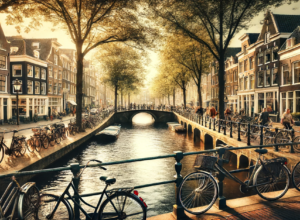You’ve finally unpacked the last box in your Amsterdam apartment, figured out how to pronounce “Prinsengracht,” and even successfully ordered coffee in Dutch. Just when you think you’re settling in, something happens that reminds you: you’re definitely not in America anymore. Sound familiar? For American expats in the Netherlands, these cultural surprises are part of what makes the adventure so fascinating—and occasionally bewildering.
While the Netherlands ranks consistently high on expat satisfaction surveys, the cultural adjustments can still catch Americans off guard. Let’s explore the ten most significant differences you’ll encounter as an American living among the Dutch, beyond the obvious windmills and cheese.
Two-Wheeled Takeover: The Dutch Bicycle Culture
If there’s one adjustment that symbolizes the American-to-Dutch transition, it’s trading four wheels for two. In the Netherlands, bicycles aren’t just for weekend recreation—they’re legitimate vehicles with their own infrastructure rivaling car networks.
Americans often describe their first experience in Dutch city centers as “bicycle chaos,” but there’s actually a beautiful order to it. With over 35,000 kilometers of dedicated cycle paths throughout the country, bikes aren’t just accommodated—they’re prioritized.
The statistics tell the story: the average Dutch person cycles 878 kilometers annually, and there are more bicycles (22.8 million) than people (17.4 million) in the country. Compare this to America, where cycling represents just 1% of all trips.
Cultural insight: The Netherlands’ cycling culture isn’t just about transportation—it’s a physical manifestation of Dutch values: practicality, egalitarianism, and sustainability. When you adopt cycling as your primary transportation, you’re embracing a core aspect of Dutch identity.
Directness: When “How Are You?” Actually Requires an Answer
“How are you doing today?”
In America, this question typically expects the response “Good, thanks!” regardless of your actual state. In the Netherlands? Be prepared to answer honestly—and hear honest responses in return.
Dutch directness often catches Americans off-guard initially. What might sound like rudeness to American ears is simply the Dutch commitment to clear, efficient communication without the buffer of unnecessary pleasantries.
A Dutch colleague might tell you plainly that your presentation needs improvement, or a neighbor might directly ask how much you paid for your apartment. These aren’t signs of disrespect but reflections of a culture that values honesty above social niceties.
Adaptation tip: Rather than feeling offended, try appreciating the time saved by directness. You’ll never need to wonder where you stand with Dutch friends or colleagues—they’ll tell you! Many Americans eventually find this refreshing after adjustment.
Work to Live, Not Live to Work: The Dutch Approach to Balance
That 9-to-5 grind you were accustomed to in America? In the Netherlands, it might be more like 9-to-4, with an actual lunch break away from your desk.
The Dutch have mastered the art of work-life balance in ways that can make American expats simultaneously envious and uncomfortable. The Netherlands ranks among the highest in work-life balance globally, with the shortest average workweek in Europe at just 29.5 hours.
Key differences American expats notice include:
- Working overtime is often viewed negatively (suggesting inefficiency)
- Part-time work is normalized and protected by law
- Minimum 20 vacation days annually (compared to America’s… zero?)
- “Out of office” truly means unavailable
Cultural insight: The Dutch philosophy isn’t “less work,” but “more effective work.” Productivity per hour remains high while burnout rates are lower than in the United States. The cultural emphasis is on working efficiently during your hours, then fully disconnecting to enjoy personal time.
Healthcare: When Getting Sick Doesn’t Mean Getting Poor
“Take two paracetamol and call me if it gets worse.”
American expats are often startled by Dutch doctors’ seemingly minimal interventions. After navigating the complex American healthcare system, the straightforward Dutch approach can feel jarringly simple.
The Dutch healthcare system operates on fundamentally different principles:
- Prevention-focused rather than treatment-focused
- General practitioners (huisarts) as gatekeepers
- Mandatory health insurance (approximately €120 monthly)
- No surprise billing
While Americans might initially feel they’re receiving less care, the World Health Organization consistently ranks Dutch healthcare among the most effective systems globally. The emphasis on preventive care and appropriate (rather than abundant) treatment leads to better outcomes at lower costs.
Adjustment strategy: Establish a relationship with a huisarts immediately upon arrival, even before you need care. Understanding the system before you need it helps reduce culture shock when health issues arise.
Dining Culture: Where the Server Won’t Bring the Check (Until You Ask)
That awkward moment when you’ve finished your meal and sit… and sit… waiting for the bill that never comes. Welcome to Dutch dining culture, where rushing diners out is considered poor service.
The American dining experience emphasizes efficiency—quick seating, prompt service, and table turnover. Dutch restaurants prioritize your enjoyment and conversation, viewing your table as yours for the evening.
Other dining differences include:
- Tipping is modest (rounding up or 5-10%)
- Water isn’t automatically served (and rarely free)
- Split bills (going “Dutch”) are normal and expected
- Servers won’t check on you repeatedly
Cultural insight: The Dutch concept of “gezelligheid” (coziness/conviviality) influences dining culture. Meals are social experiences meant to be savored, not rushed transactions. When in the Netherlands, embrace the slower pace—your blood pressure will thank you.
Social Circles: Breaking Into the Dutch Inner Ring
“It takes time to enter a Dutch person’s social circle, but once you’re in, you’re in for life.”
This common expat observation captures the essence of Dutch social structure, which often feels impenetrable to Americans accustomed to faster, more casual friendship formation.
Dutch social relationships typically follow a pattern unfamiliar to Americans:
- Less small talk, more substantial conversation
- Smaller, tighter friend groups maintained for decades
- Social calendars planned weeks or months in advance
- Clear separation between work relationships and friendships
The concept of “dropping by” unannounced—sometimes normal in American culture—can be considered intrusive in the Netherlands. Dutch social lives are carefully structured, with clear boundaries between public and private spheres.
Integration strategy: Join clubs, sports teams, or language classes to meet Dutch people in settings where they’re open to new connections. Patience is essential—quality over quantity applies to Dutch friendships.
Transportation Beyond Bikes: Public Transit That Actually Works
Americans moving to the Netherlands experience what can only be described as public transportation culture shock. Coming from a country where car ownership is practically mandatory in most regions, the comprehensive Dutch public transit network feels like science fiction.
Nearly every corner of the country is accessible via:
- An extensive train network (NS)
- Trams and metros in urban areas
- Bus connections to smaller towns
- Integrated payment systems (OV-chipkaart)
The Dutch expect and receive punctuality, cleanliness, and efficiency from their public transportation system. When delays exceed a few minutes, formal apologies are issued—a stark contrast to American expectations of public transit.
Practical tip: Download the NS app immediately upon arrival. Not only does it provide real-time updates and planning, but it also offers significant discounts compared to purchasing tickets at stations.
Compact Living: Understanding Dutch Housing Philosophy
“What do you mean there’s no closet?”
American expats often experience genuine shock at Dutch housing. After all, the average American home is nearly three times larger than the average Dutch dwelling. This isn’t just about available space—it reflects fundamentally different perspectives on housing.
Key differences in Dutch housing include:
- Steep, narrow staircases (sometimes described as “ladder-like”)
- Multifunctional spaces rather than single-purpose rooms
- Minimal built-in storage
- Emphasis on natural light and efficient use of space
The Dutch concept of “gezellig” (cozy and inviting) takes precedence over spaciousness. Additionally, Dutch homes are built for remarkable energy efficiency, with excellent insulation and innovative heating solutions.
Adaptation approach: Embrace vertical storage, multipurpose furniture, and regular decluttering. Many American expats report that adjusting to smaller living spaces ultimately feels liberating rather than limiting.
Weather Resilience: Rain Never Stops the Dutch
“There’s no such thing as bad weather, only inappropriate clothing.”
This popular Dutch saying perfectly captures their philosophical approach to the Netherlands’ notoriously fickle climate. While Americans might cancel plans due to rain, the Dutch simply adapt and continue.
The Dutch relationship with weather includes:
- Biking through rain, sleet, and moderate snow
- Embracing outdoor seating with blankets, even in cooler weather
- Celebrating rare sunny days with immediate outdoor activities
- Building infrastructure that accommodates weather realities
According to the Royal Netherlands Meteorological Institute, the country averages 170 days with rainfall annually—yet life continues uninterrupted, a testament to Dutch pragmatism.
Cultural insight: The Dutch don’t fight nature; they work with it. This philosophy extends beyond weather to the country’s famous water management systems and is central to Dutch identity. Learning to embrace rather than resist the elements will significantly improve your expat experience.
Celebrations & Traditions: Finding Your Orange Spirit
Your first King’s Day (Koningsdag) as an American expat is an experience you’ll never forget—a sea of orange, nationwide celebrations, and a festive atmosphere unlike anything in the United States.
Dutch celebrations reflect cultural values and historical significance:
- King’s Day (April 27): National celebration with orange attire, street markets, and festivities
- Sinterklaas (December 5): Gift-giving holiday with complex traditions predating Santa Claus
- Liberation Day (May 5): Commemorating the end of Nazi occupation
- Canal Pride (August): Amsterdam’s vibrant LGBTQ+ celebration
While missing familiar American holidays like Thanksgiving can be challenging, embracing Dutch celebrations provides valuable cultural insight and community connection.
Integration opportunity: Participating in Dutch celebrations offers natural opportunities to experience Dutch culture authentically. Don’t just observe—participate! Wear orange on King’s Day, exchange poems for Sinterklaas, and attend local Liberation Day events.
Embracing Your Dual Cultural Perspective
As an American adjusting to Dutch life, you’re developing something valuable: a bicultural perspective that enriches your understanding of both countries. Each cultural difference you navigate adds depth to your experience and transforms you from tourist to true expat.
Remember that culture shock works both ways—the aspects of American culture you took for granted become more apparent through contrast with Dutch norms. This heightened awareness is a gift, allowing you to appreciate elements of both cultures with fresh eyes.
The most successful American expats in the Netherlands find their balance—adopting Dutch practices that resonate while maintaining valued American traditions. This cultural integration becomes not just a survival strategy but the foundation for a rich, fulfilling international life.
Have you encountered other surprising differences between American and Dutch culture? Share your experiences in the comments below!








